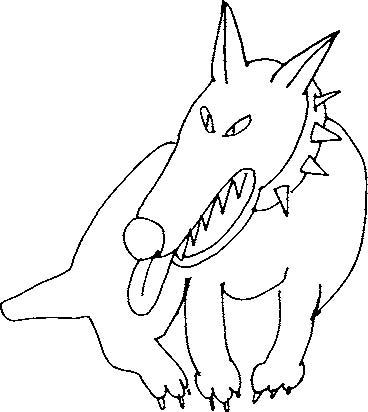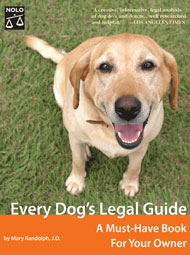Dangerous Dog Laws
"Vicious dog" or "dangerous dog" laws impose special restrictions on dogs that are officially labeled dangerous or potentially dangerous. These laws, which emphasize prevention, have much to commend them. By focusing on dogs known to pose a danger to people, they can protect the public, crack down on irresponsible dog owners, and lessen the temptation to over-regulate (as in the case of breed-specific bans, discussed below). Unfortunately, many of the laws are so vague that they invite arbitrary enforcement.
Most dangerous dog laws are local, but more and more states are passing such laws. The state laws follow the same general pattern, although they differ significantly from state to state.
Generally, the process of having a dog declared dangerous is set in motion by a formal complaint from an animal control officer or someone who has been threatened or injured by the dog. A hearing follows, at which a judge or public health official hears evidence and determines whether or not the accused dog is actually dangerous under the terms of the law.
If a dog is found to be dangerous, the judge will order the owner to take certain measures to prevent the dog from injuring anyone. At the least, the owner will have to keep the dog securely confined. If the judge determines that the danger can't be kept within an acceptable level, the owner may be ordered to have the dog destroyed or remove it from the city. An owner who violates the court's order will probably be fined and possibly be jailed, especially if the dog seriously injures someone. The dog will be impounded and probably killed.
| California | Maryland | Oklahoma |
| Colorado | Massachusetts | Pennsylvania |
| Delaware | Michigan | Rhode Island |
| District of Columbia | Minnesota | South Carolina |
| Florida | Nebraska | South Dakota |
| Georgia | Nevada | Texas |
| Hawaii | New Hampshire | Vermont |
| Illinois | New Jersey | Virginia* |
| Kentucky | New York | Washington |
| Louisiana | North Carolina | West Virginia |
| Maine | Ohio |
*cities or counties can enact dangerous dog lows that comply with state requirements
Many other states have laws on the books that make it illegal to keep vicious dogs or dogs that are a "public nuisance," but don't provide a procedure for having a judge determine what dogs are vicious. In South Dakota, for example, it is illegal to keep a vicious dog, which is defined as a dog that attacks people unprovoked.1 These laws aren't much help when it comes to preventing injuries; they serve primarily to increase penalties on owners after a dog injures someone.
The next sections discuss the procedures for having a dog declared dangerous.

The Complaint
If a dog has threatened or attacked someone, the frightened or injured person may file a formal complaint with the agency or court in charge of implementing the dangerous dog law. In many places, a local court receives complaints, but sometimes they are handled by the local sheriff, health department, or animal control department.
Who may make such a complaint depends on the law. Most laws allow anyone to complain, but in some states, only a person who has been attacked may lodge a formal complaint. In Vermont, it takes three residents of a town to file a written complaint with the town legislature (selectmen, aldermen, or trustees), and they may do so only if they know that a dog has bitten someone while off the premises of its owner or keeper.2 Under most laws, law enforcement and animal control officers may also file a complaint.
After a complaint is made, a dog that has seriously hurt someone may be seized and held until the hearing is held. New York law, for example, allows a judge to order a dog impounded before the hearing if there is "probable cause" to believe the dog is dangerous.3 Similar rules apply in most places. As a practical matter, by the time a hearing has been scheduled to determine the viciousness of a dog, the dog will probably have been impounded.
Under most dangerous dog laws, after a dog owner has been notified of a complaint, a hearing is held to determine if the dog is dangerous, as that term is defined in the law.
In some states, however, a hearing is held only if the dog owner requests one, after an animal control officer has investigated a complaint and decided to classify the dog as dangerous. The owner is mailed a notice of the decision and gets a chance to argue only by requesting a hearing.
The Hearing
To meet constitutional due process requirements, the law must give dog owners some kind of opportunity for a hearing. The Ohio Supreme Court overturned that state's vicious dog law because it didn't give owners a meaningful opportunity to be heard.4
Basically, the hearing is a shorter, less formal version of a trial. The dog owner, the person who complained, and members of the public can attend and present evidence about the dog's behavior or disposition. Expert witnesses may testify about the likelihood that the dog will cause more problems.
Most often, judges in local courts preside over these hearings. Local health or animal authorities, however, may sometimes hold hearings and make dangerous dog determinations.
Ultimately, the judge's decision must be based on the statute or ordinance, which will define the term "dangerous dog." These definitions range from vague to extremely detailed. Rhode Island officials, for example, have a detailed definition to help them make their decisions. According to the state statute, a vicious dog is one that:
- threatens someone, unprovoked, in a public place
- has a known tendency to attack unprovoked or otherwise endanger people or other domestic animals
- bites, injures, or attacks a person or domestic animal without provocation, on public or private property
- is trained or kept for dog-fighting, or
- isn't licensed.
The Rhode Island law states that a dog cannot, however, be declared vicious if it injured someone who was deliberately trespassing on the dog owner's property, teasing or abusing the dog, assaulting another person, or committing a crime.
This statute is more detailed than most. But the factors it sets out are the things any judge would consider when determining whether or not a dog is dangerous. (Note that all unlicensed dogs are automatically considered vicious; not a very logical label, but a very good reason for licensing your dog. The law does provide that the vicious dog label is removed when the owner licenses the dog and pays the fine.)
Under this statute, a dog owner who wants to appeal a vicious dog determination has five days to petition the district court for a new hearing. The court then conducts its own hearing and decides whether the dog is vicious according to the law's definition.5
Restrictions on Dangerous Dogs
Usually, a judge who pronounces a dog dangerous has fairly free rein to impose penalties or restrictions on the dog's owner. At a minimum, laws require that the dog be kept enclosed on the owner's property at all times unless it's leashed and, in some places, muzzled as well. The judge may also order the dog to be sterilized. Again, the Rhode Island statute spells out in great detail the conditions under which a vicious dog is allowed off its owner's property. There, it is unlawful for an owner to let a vicious dog outside the owner's dwelling or a locked enclosure
unless it is necessary … to obtain veterinary care … or to sell or give away the vicious dog or to comply with commands or directions of the dog officer In such event, the vicious dog shall be securely muzzled and restrained with a chain having a minimum tensile strength of three hundred (300) pounds and not exceeding three feet (3') in length, and shall be under the direct control and supervision of the owner or keeper of the vicious dog.
Depending on the specific city or state law and the danger posed by the dog, its owner may also be required to:
- Post "Beware of Dog" signs prominently. Some states require a sign that contains a warning symbol, not just words, to alert young children.
- Keep the dog in a locked enclosure, or one that meets certain specifications for height, strength, and other features.
- Buy a certain amount of liability insurance (usually no more than $100,000) that covers damage or injury caused by the dog.
- Post a bond with the city or county to cover any damage or injury caused by the dog.
- Obtain a special "vicious dog" license from the city or county. These licenses are much more expensive than the standard license; for example, in New Jersey, they cost $150 to $700 annually.
- Have the dog permanently identified with a tattoo or microchip.
- Notify animal control officials if the dog is sold or given away, and notify the new owner in writing that the dog has injured someone.
A judge who decides that a dog poses a great risk of serious harm may order that the dog be seized and humanely killed by animal control authorities. This penalty, of course, is reserved for dogs considered incorrigible: dogs that have repeatedly bitten people, severely injured or killed someone, or have been trained and used for fighting.
A few states, however, don't give the judge any choice. In Michigan, if a dog is found to be dangerous and has caused serious injury or death to a person - or to another dog - the court must order the dog to be destroyed.6 The same is true in North Dakota; if a dog is found to be a public nuisance that "habitually molests persons traveling peaceably on the public road," the judge must order a peace officer to kill the dog.7
Injuries Caused by Dangerous Dogs
Once a dog has been declared legally vicious but allowed to live, it's unlikely to get a second chance if its owner doesn't follow the judge's restrictions scrupulously. The laws of Kentucky, for example, authorize peace officers to kill any dog that has been found to be vicious if it is running at large.8
At the least, a dog officially labeled vicious will be impounded if it later injures someone. Owners may also have to pay double or triple damages to the injured person. In Maine, for example, an owner who doesn't comply with a judge's order to confine or muzzle a dog is liable for three times the amount of damage the dog causes.9 In Rhode Island, if a vicious dog injures someone, the owner must pay a fine to the government and triple damages to the injured person.
The owner of a vicious dog who doesn't comply with the law's conditions on keeping the dog securely confined and away from people may be guilty of a crime. (See "Criminal Penalties for Owners of Dangerous Dogs," below.)
